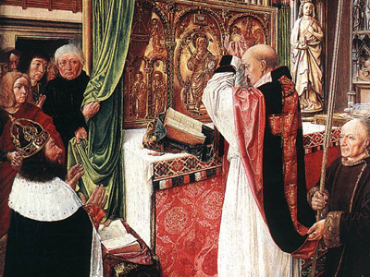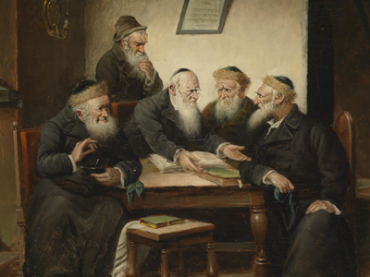Religion
Wolf’s Anti-Homeric Theory, as applied to the Pentateuch
By Anonymous
Series: Analecta Gorgiana 790
ISBN: 978-1-61143-168-1
The article rejects the argument that the Bible was not solely penned by Moses. He examines the evidence and presents his own to oppose it. He concludes that neither side of the argument can be proven.
$34.00
The Act and Testimony
By Anonymous
Series: Analecta Gorgiana 791
ISBN: 978-1-61143-169-8
The article criticizes the Presbyterian Church’s recent Act and Testimony. The author claims it is excessive, leaving no room for interpretation, and is dangerously schismatic. It would divide the Church for no reason.
$34.00
The Church Establishment of England
By Anonymous
Series: Analecta Gorgiana 792
ISBN: 978-1-61143-170-4
The author reviews a pamphlet that criticizes the connection between church and state in England. He attacks the bias inherent in the system, the inefficiency of it, and its inability to fulfill its churchly duties.
$36.00
Professor Stuart’s Postscript to his Letter to the Editors of the Biblical Repertory
By Anonymous
Series: Analecta Gorgiana 793
ISBN: 978-1-61143-171-1
The article responds to a postscript from a letter to the editor on the journal’s position on loans by the American Education Society. The editor counters the writer’s claims and defends the journal’s prior position.
$36.00
An Essay on the Invalidity of Presbyterian Ordination
By John Esten Cooke, M.D. Lexington. 8vo. Pp. 224. 1829
By Anonymous
Series: Analecta Gorgiana 794
ISBN: 978-1-61143-172-8
The article reviews and critiques an essay that attacks Presbyterian ordination. The reviewer points to logical and textual flaws in the argument, indicating the author’s incompetence.
$40.00
Review on the Scripture Doctrine of the Second Advent
By Anonymous
Series: Analecta Gorgiana 795
ISBN: 978-1-61143-173-5
The article reviews a text on the Second Advent. The reviewer compares two perspectives on the scriptural descriptions of the Second Coming: either it will literally look as is depicted or the prophecies are allegories.
$37.00
The Early History of Pelagianism
By Anonymous
Series: Analecta Gorgiana 796
ISBN: 978-1-61143-174-2
The author presents the history of Pelagius and his position against original sin. He reviews the positions for and against the doctrine of original sin, concluding that original sin cannot be proven true.
$39.00
Elements of Mental and Moral Science
Designed to Exhibit the Original Susceptibilities of the Mind, and the Rule by Which the Rectitude of Any of its States or Feelings Should be Judged
Series: Analecta Gorgiana 797
ISBN: 978-1-61143-175-9
The article reviews a set of texts on mental philosophy. It reviews the author’s assessments of various sources and the aspects of the mind. The reviewer takes issue with certain philosophers’ beliefs.
$37.00
The Annual of the Board of Education of the General Assembly of the Presbyterian Church in the Unite
By Anonymous
Series: Analecta Gorgiana 798
ISBN: 978-1-61143-176-6
The reviewer praises an annual, comprised of a series of articles, as valuable for students entering the ministry. The author advocates modesty, hard work and piety amongst other virtues.
$35.00
Gall's Lesson System of Education
By Anonymous
Series: Analecta Gorgiana 800
ISBN: 978-1-61143-178-0
The author reviews a text which proposes a “Lesson System” to replace the current ineffective Sabbath school model. The new system fixes many of the old system’s errors and has been successfully implemented in a few places.
$37.00
The Life of William Farel
Prepared from original authorities
By Anonymous
Series: Analecta Gorgiana 801
ISBN: 978-1-61143-179-7
The reviewer examines a biography of Protestant Reformer William Farel. The book describes Farel’s departure from Catholicism and contributions to the efforts of Swiss Reformation, Zuingle in particular. His trails and successes are described.
$35.00
Theories of Education
By Anonymous
Series: Analecta Gorgiana 802
ISBN: 978-1-61143-180-3
The author attacks practices common in newer forms of education. He generally calls for a more conservative, less experimental, approach which emphasizes deep general knowledge. No formal method is offered to replace the broken system.
$34.00
The Racovian Catechism
By Anonymous
Series: Analecta Gorgiana 803
ISBN: 978-1-61143-181-0
The author provides the biography of Socianism founder Faustus Socinus. The article provides a partial translation of his posthumously compiled “Racovian Catechism” from the original Polish with the intention of revealing information about Socianism.
$36.00
Roman Catholicism
By Anonymous
Series: Analecta Gorgiana 804
ISBN: 978-1-61143-182-7
A scathing polemic against Roman Catholicism, the author uses logical and textual evidence to contradict Catholic rituals and beliefs.
$35.00
Hints on Colonization and Abolition
With reference to the black race
By Anonymous
Series: Analecta Gorgiana 806
ISBN: 978-1-61143-184-1
The author attacks American slavery but disputes the call to instant abolition and race-mixing. He advocates the American Colonization Society’s “back-to-Africa” approach as well as a slow, political approach to ending slavery in America.
$36.00
An Apology for Conforming to the Protestant Episcopal Church
Contained in a series of Letters addressed to the Reverend Benjamin T. Onderdonk, D.D., Bishop of the Diocese of New York. By Thomas S. Brittan.
By Anonymous
Series: Analecta Gorgiana 808
ISBN: 978-1-61143-186-5
The article reviews a text by a convert from Presbyterianism to the Protestant Episcopal Church. The reviewer is critical of much of the evidence the author uses and declares the book to be poor in quality and unoriginal.
$36.00
Quakerism not Christianity
Or Reasons for renouncing the doctrine of Friends. In three parts. By Samuel Hanson Cox, D.D., Pastor of the Laight Street Presbyterian Church; and for twenty years a member of the Society of Friends. Pp. 686.
By Anonymous
Series: Analecta Gorgiana 810
ISBN: 978-1-61143-188-9
The article reviews a book which is highly critical of Quakerism. The reviewer relates a brief history of Quakerism and proceeds to challenge Quaker doctrines. Quakerism is described as an incorrect form of Christianity.
$36.00
Memoir of the Rev. George Burder, author of “Village Sermons,” and Secretary of the London Missionar
By Henry Foster Burder, DD
By Anonymous
Series: Analecta Gorgiana 811
ISBN: 978-1-61143-189-6
The article reviews the memoir of Rev. George Burder. The reviewer outlines the reverend’s family, his entrance to the ministry, his shift into missionary work, his preaching, and his hardships. The reviewer judges his style and persona.
$35.00
A Treatise on the Parables of our Lord
Series: Analecta Gorgiana 812
ISBN: 978-1-61143-190-2
This article introduces and translates “A Treatise on the Parables of our Lord” by Rev. Fredrick Gustavus Lisco of Berlin. The treatise defines and traces the history of parables. Using critical sources, he explores New Testament parables.
$35.00
Remarks on the Epistles of Ignatius
By Anonymous
Series: Analecta Gorgiana 814
ISBN: 978-1-61143-192-6
The article describes and critiques the authenticity of the epistles of Ignatius. The author claims that the illegitimacy of letters that speak of prelacy erodes the basis for Episcopacy and Presbyterianism.
$35.00
Lectionary of the Syriac Epistles
According to the Ancient Rite of the Syrian Orthodox Church of Antioch
Edited by George Anton Kiraz; Introduction by Julius Yeshu Çiçek
Series: Bar Ebroyo Kloster Publications 6
ISBN: 978-1-61143-200-8
This volume presents the Lectionary readings from the epistles according to the liturgical rite of the Syrian Orthodox Church. The text is presented in a vocalized Serto text with readings separated by section headings in red font.
$132.00
The Liturgy of the Sacrament of Penance
Series: Bar Ebroyo Kloster Publications 9
ISBN: 978-1-61143-203-9
The present volume contains the text of the rite for the liturgy of penance, one of the sacraments of the Syriac Orthodox Church of Antioch.
$109.00
A Commentary on the 100 Theses of Evagrius Ponticus
Series: Bar Ebroyo Kloster Publications 10
ISBN: 978-1-61143-204-6
The present work presents the text of Dionysius bar Salibi's commentary on the "100 Theses" concerning the ascetic life by Evagrius Ponticus.
$122.00
The Sacraments of Holy Baptism, Marriage, and Burial of the Dead
According to the Ancient Rite of the Syrian Orthodox Church of Antioch
Series: Bar Ebroyo Kloster Publications 17
ISBN: 978-1-61143-211-4
The present volume is a bi-lingual (Syriac and German) edition of the liturgies for Baptism, Marriage, and Burial according to the rite of the Syrian Orthodox Church of Antioch.
$179.00
The Sacrament of Eucharist
By Ignatius Zakka I Iwas; Translated by Clemens Augin Kaplan
Series: Bar Ebroyo Kloster Publications 23
ISBN: 978-1-61143-217-6
This volume contains the liturgy for the sacrament of Eucharist according to the rite of the Syrian Orthodox Church of Antioch.
$109.00
Filter by
Filter by price
Filter by manufacturer



























